The Hawaii Tourism Authority (HTA) has elected pro-hotel, former Mayor of Honolulu, and long-time politician, Mufi Hannemann, to lead the HTA. The decision occurred yesterday, wherein the board replaced Hawaiian Airlines’ Blaine Miyasato. We’ll give you our sense of both changes today.
Blaine has long served Hawaiian Airlines and will become part of the Alaska Airlines merger team. His current title at Hawaiian is managing director of state and local government affairs. Blaine has been with the airline for 40 years and has served across multiple departments and positions. He will stay on at HTA, at least for now, as one of the HTA regular board members.
The change of leadership at HTA from a top airline executive to the current president and CEO of the Hawaii Lodging and Tourism Association (HLTA) is a significant gain for hotels and concerning to those in the vacation rental sector. How Hannemann balances his perceived conflict of interest will be interesting to watch in the ongoing HTA saga detailed below.
One thing’s for certain. Hawaii vacation rentals are at risk. And this news comes just days after we heard the governor say that he would entertain at least a short-term moratorium on Maui vacation rentals. See Possible Moratorium Looms Over Maui Vacation Rentals.
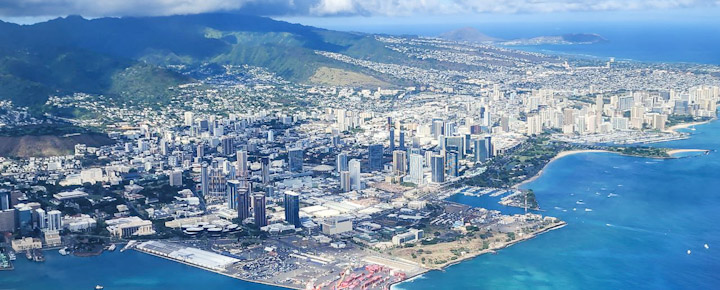

Hawaii’s tourism future is less shaky but still unknown.
The all-important Hawaii Tourism Authority has only an interim president, prior chief administrative head Daniel Naho‘opi‘i. He commented that Mufi has a “strong vision and passion for how HTA and tourism can make Hawaii a better place to live and work.”
The head of Hawaii’s Department of Business, Economic Development and Tourism (DBEDT) called for a pause following prior HTA president John De Fries’ decision to leave his position effective 9/15/23 for unknown reasons. Jimmy Tokioka, DBEDT head, said of the latest mess that the state needs to “figure out what it’s going to take for the Legislature to trust the authority moving forward.”
A Hawaii bill before the legislature called for entirely repealing the HTA and moving its authority to within the DBEDT. That bill was deferred, although other state officials continue to call for upending HTA to a greater or lesser degree.
What is Hannemann’s Hawaii Lodging and Tourism Association?
The pro-hotel group previously said previously it is “nearly 700 members strong, representing more than 50,000 hotel rooms and nearly 40,000 lodging workers.” It has long sought to regulate Hawaii vacation rentals further.
Others have suggested that Mufi’s groups efforts against vacation rentals can be termed as a “blatant attempt by hotel groups such as The Hawaii Lodging and Tourism Association to squelch competition” from Hawaii vacation rentals.
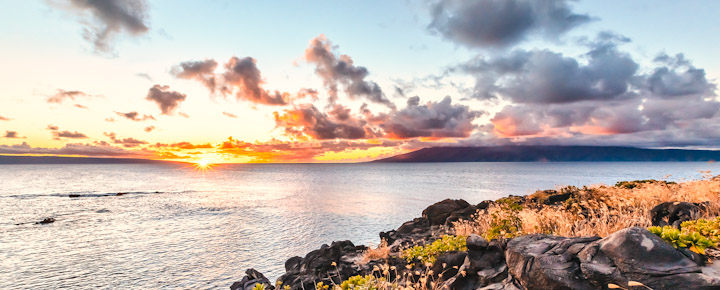

Their positions include a no-green fee but instead promote “Impact Fees.”
According to Mufi’s HLTA organization, these are for “high-traffic tourist attractions around the
state… We would support the assessment of fees from travelers impacting a specific resource so long as these monies are kept separate from any general fund and are used specifically to maintain and improve the site at which they were collected.”
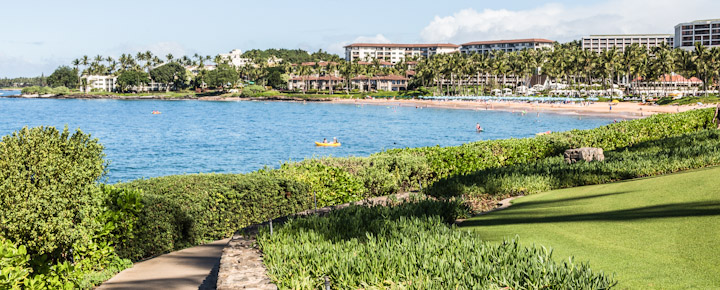

Regarding vacation rentals, it appears to be a rather hard no.
In HLTA’s 2023 mission statement, Mufi’s organization said, “Reducing the number of STRs (short-term or vacation rentals) owned and operated by extractive and exploitative individuals would immediately improve our housing inventory, and HLTA will look to support legislation to this effect.”
Hannemann serves as the president and CEO of HLTA.
In a vague and expected comment that accompanied the announcement of his appointment at HTA, Hannemann said, “HTA carries with it the duty to always do what’s best for the future of Hawaii and its people while guiding our state’s largest and most important industry to be continually successful in the extremely competitive global tourism economy. I’m honored to have the board’s confidence in serving as chair and look forward to working collaboratively with Governor Josh Green, our Legislature, and HTA’s leadership team to respond to the challenges faced by the industry so that everyone can share in the benefits tourism generates for Hawaii, while also taking care of our communities.”
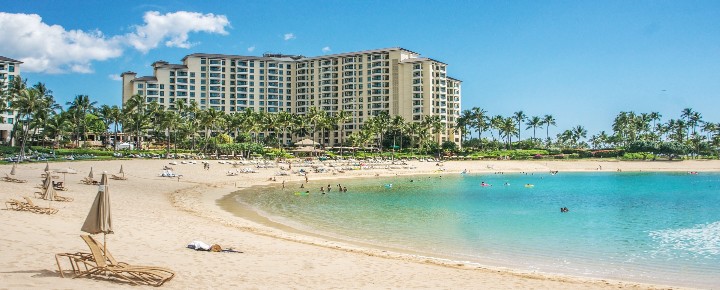

The state of Hawaii Tourism now and in the future.
The Hawaii Tourism Authority (HTA) had been facing potential elimination by the legislature. This summer, HTA introduced its latest initiative, the “Holomua” website, which aimed to educate visitors and others about the islands’ community-based Destination Management Action Plans (DMAPs). However, the practical value of these plans for visitors has remained elusive. DMAPs strive to balance between the benefits of tourism and its impact on natural resources and frequently visited areas.
Legislator Sean Quinlan proclaimed that HTA has been good at selling Hawaii but that a shift to better management of Hawaii resources is needed.
Hawaii lawmakers previously tried to eliminate HTA, with its role falling on Hawaii’s Department of Business, Economic Development, and Tourism. That now seems less likely, although Quinlan’s plan, for example, will be for HTA or DBEDT to focus on destination management rather than on marketing Hawaii.
Get Breaking Hawaii Travel News
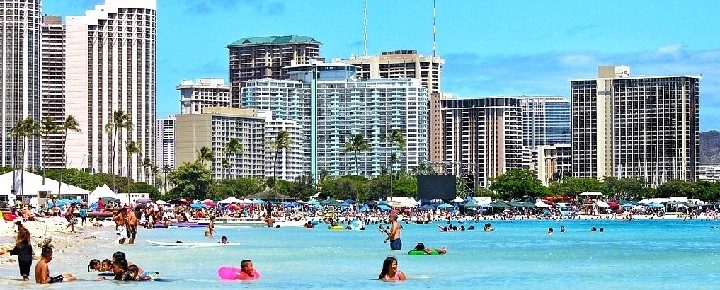






In the vacation zone Kailua kona BI, I see a lot less international visitors .Weakness in Canadian, Japanese currency have defiantly reduced the occupancy rates greatly. Rich people don’t want to retire here full time due to the heat and taxes, poor people don’t want to work two jobs. The middle class and foreigners are priced out by high cost and foreign exchange. I think the HTA should focus on getting more intermediate visitors, one to three months, these having less environmental impact.
More buses, less rental cars would be help get more tourism with
minimal impacts. If the law were changed to allow 2 or 3 month “short term” rentals, this could help a lot.
Some good points . Many working class people I’m the US can’t take 2 to 3 months off to enjoy Hawaii or anywhere
Its easy to add and increase taxes and user fees. But it’s hard to rewrite landlord tenant law, to facilitate intermediate stay visitors.
Seems like the HTA is owned by the hotels and airline industry anyway. Hawaii is an isolated state, decoupled from mainland by the Jones act, so the incumbent players continue to earn the winnings of limited competition. That kind of economic power is
self-reinforcing…
Bill I disagree. The whole islands are a resort so why limit where people can stay? You sound like someone associated with the hotel cabals. Why do the hotels feel so threatened by the srts ? It’s not like they pay good enough wages for a family to live on. Besides all the profits goes offshore anyway.
We just returned from visiting Oahu and we loved our stay in a cozy studio Str from a local owner-occupied homeowner. And we got to support a family’s economy directly.
I think the state of Hawaii missed in their legislation to ban strs. Airbnb and VRBO were even willing to collect rental taxes for the State; missed opportunity on that tax revenue. The state should allow them in owner occupied properties.
My husband was recently forced to stay in a hotel because no STVR’s were available.
This was his experience: he paid double the norm for a tiny room, with a disgusting shower, no water pressure, and add-on fees upon arrival.
American should have a choice in lodging. Anything other is archaic.
This is a myth. “Reducing the number of STRs … would immediately improve our housing inventory…”
Vacation rentals typically take up less than 1% of housing inventory. Any reports otherwise have been paid for by the Hotel Lobby— incredibly well-funded organization.
For instance, NYC just banned STVR’s, and yet STVR’s took up Less than one half of one percent of all housing.
The hotel lobby has gotten into lawmaker’s pockets. Period.
In a ever more frequent scenario playing out in Hawaii and all across our country, politicians and connected insiders are getting the shock of their lives as that seemingly endless pot of cash they’ve been gorging themselves on for decades has been sliced, diced, and debased into fractions of its former value and now they’re fighting over the last miserable crumbs… This won’t end well IMHO…
Best Regards
BOH, do you have any statistics on how many vacation rentals are in actual neighborhoods (residential, ag, etc.) as opposed to traditional vacation rentals that were built as such? My guess is that the latter is in the thousands, whereas the former is multiples less. If it is believed that most short-term rentals are in neighborhoods, it may not make much difference at all to eliminate them.
Hi Pat.
Sorry, no we do not. Maybe someone else can give us a hand.
Aloha.
The State needs to dump All vacation rentals across the entire State that are not in areas zoned resort.
These are speculative investments on Shelter and are a large part of the housing shortage.
Get them out of ALL residential and agricultural zones, no exceptions.
This is factually incorrect. Most STVRs take up less than 1% of the housing in any given market.
This is the myth being spread by the Hotel Lobby. Why are they so threatened by regular folks trying to make a living, and supporting the local economy by doing so? Isn’t their profit margin high enough?
People should have a choice in where and how they lodge.
Big Corp’s mission statement is to eliminate all mom & pop owned competition. They have the deep pockets to make STR’s a thing of the past.
By the way just got back from our BI Costco Travel package to Hapuna Beach resort.
Perfect weather, ocean was warm, Hapuna beach is awesome and no sunburn. That was a great package deal already booked for Hapuna for October with similar deal through Costco.
To Sandi,
My same thoughts. It seems that very few
are paying attention! We are entertaining
ourselves to death.
It states in here that STR hosts are greedy, I’m a senior and use this income to pay for house insurance, hurricane insurance and just exist! The hotel owners are the greedy ones here, making it almost impossible for a family to stay in Hawaii with Rockstar prices, as far a turning my home into a long term rental, Well, try having your renters not pay rent for 6 months, trash the house and to evict them, the landlord has to pay over 10k to sheriffs to fly from Maui to serve eviction papers because Big island sheriffs refuse to serve them! No Mufi, put that in your pipe and suck on that for a while, who the (Greedy) one, hotel owner have him in their pocket! I see kickbacks in your future 😡😡, signed, Discusted!!
Sighhhhhhh! The World as we once knew it is being destroyed bit by bit by bit. Over population, climate change, corporate greed, decreased democracy, and ignorance will be the final nail in the coffin of life!
Thanks Hawaii, for making my vacation plans easier. Cross off Hawaii and in Google type “VRBO Tampa, Florida” or “VRBO Las Vegas”
VRBO Panama City Beach (as long as you avoid times when the college kids are there)
Oops, what’s that do to the “timeshare-like” package/system Besos implemented?
Lots of local people own vacation rentals on the island and have supportive business’s that help there families make a living. Vacation rentals pay a higher tax rates than hotels because they do not have big corporations behind them. So by getting rid of vacation rentals the tax revenue will go down for the state because hotels pay much less. Hotels will be running the islands and not individual who invested into the economy. I think the vacation rental people need to get together and make there voices heard. Hotels are a very expensive choise for most to stay in. Going after vacation rentals will allow hotels to raise there rates and have no competition. Small local investers will not have options of being there own boss .
All short term rentals need to be abolished in residential and agricultural zones. No exceptions.
If someone needs to make an income speculating in shelter then they need to find a job or other occupation to pay the bills. Most of these speculative mini-hotels are owned by people and companies that do not live or exist in Hawaii.
Defund HTA, yesterday.
Frankly, although I didn’t love him as our mayor, he seems to have the right things in mind for preventing over-tourism from both displacing locals houses and protecting our natural land and water resources.
Two things pop out to me as I read this article. First are the “green” fees. Once your state govt sees this money pile up, it will be used to pay for favors from supporters. And second, will be the skyrocketing hotel prices and any fees they can add to your hotel bill. I had one Outrigger hotel tell me the resort fee included beach access! I am lucky that I can stay at the Hale Koa.
These problems can be summed up in three simple words: Elections have consequences.
Good luck Hawaii, you have some troubling times ahead.
Well the employee was either under-informed or lying, because all beaches are public at the high water mark here.
“Reducing the number of STRs (short-term or vacation rentals) owned and operated by extractive and exploitative individuals …” I think they mean Hotels and their owners being exploitative. Should STRs be stopped, we definitely would no longer visit. We are visiting in June with adult kids and grandkids to celebrate our 45 years of marriage. We are renting a STR but could never afford this trip using hotels.
Blatant conflict of interest. Blatant. This board action should be rescinded. If not, dissolve the HTA.
What stands out to me: Reducing STVR’s owned by “extractive and exploitative individuals”. Sounds like mainlanders to me. Fasten your seatbelt.
I sold my vacation rental condo in Kauai in August. It looks like my
timing may have been perfect. They make the owners of these vacation rental units look like their enemy. What a shame if this does happen.
I guess the new head of the HTA doesn’t like families. Families of 4 or more will not be able to visit Hawaii without short-term rentals. Who can afford 2 or more hotel rooms at $600+ a night each?
This has nothing to do with the vacation rentals, but may be of interest to those involved in Maui tourism – Holland America just introduced a new category of cruise called a “Legendary Voyage” – the first one of which that I have seen is a 25-day cruise starting in Seattle, visiting 5 locations in Alaska (incl. Anchorage and Dutch Harbor) and then sailing down to Hawaii, with stops in Kauai, Oahu, and the Big Island (Hilo & Kona). No Maui stops. This is scheduled for August/September 2025.
For myself I have decided to avoid the islands of Hawaii because certain people in the Hawaii Tourist Industry want to eliminate or curtail certain facilities and force tourists to stay in hotels and cause financial pain to others. I am betting that many others will follow suit!
I have listened to politicians and others in positions of control over the tourism and resort industry claim that by eliminating vacation rentals that it will immediately improve the housing inventory and solve the problem of a lack of affordable housing. What are these people smoking? I’m a real estate agent and I’ve been an agent in various cities that made this same claim. Do they magically think that housing prices will drop? Do they think that all of a sudden, rental properties will now rent long term at a much lower rate than a vacation rental? What will happen is that by reduced competition, hotels will again start charging exorbitant fees and diminish value to the traveler.
Hi Andy, we here don‘t have that illusion. What we want local government to do is to stop the bleeding out, house by house, of our neighborhoods being bought out by outside vaca rental investors. Mufi‘s group is simply voicing what we all feel. They are doing tourists a service, by voicing what we all feel, at least verbally. This is not about the hotels. This is neighborhoods struggling about survival.
And locals struggling to live here in a place bought by national and international outsiders to use as an occasional visit stop and renting as a STR the rest of the time. House by house, we keep getting squeezed out. I applaud this initiative.
Confused about description STR? Is it BNB, or is it the “vacation” condos that were built for tourism,bought, sold, & reinvested to rent for tourists. Some decided to purchase for their homes as a side note. I am quite confused& irritated about .the “locals” proclaiming that they can live quite well on their own on an island..Yet, I would Love to see a small business meeting, discussing local mades and the succes building their own homes, growing their own life sustaining foods, and hand making their clothes, etc. What %? Where is the common sense that even “so-calledlocals” have been customed to Americanized culture. The simple life is all fun and games until it is forced upon you.
Very astute distinction. There are thousands of condos in Hawaii that were built as vacation rentals over 50 years ago when tourism here began to flourish. Those condos were never intended to be permanent housing for local residents. They have inadequate parking, no play areas, and no storage for long-term use. Those properties are different from houses and apartments that were built as traditional local housing in real neighborhoods. For residents to go after those traditional and long-standing vacation rentals is barking up the wrong tree.
We will not travel to Hawaii if vacation rentals are restricted (cost increased). We rarely travel and stay in hotels, almost exclusively stay in vacation rentals. For a couple of primary reasons … reduced cost and increased convenience.
Removing Kauai from our future travel plans would be very disheartening/disappointing as it is our favorite place on Earth. But, if Hawaii doesn’t want us … well, we can take a hint.
Being from Arizona where we see our fair share of tourists and snow birds … I find it disingenuous of Hawaii and not very Aloha.
I believe Maui is finding out how important our vacation investment means to their local economy. It is disappointing that we are valued but found to be such an inconvenience.
We wholeheartedly concur. We visit Hawaii for a month or two at a time. You’re going to forcibly prevent us from renting a SFH or a condo, where we can prepare food and have multiple bedrooms at a reasonable price? You think we’re going to spend weeks in a hotel, with all the noise and no kitchen? Answer: we will not.
Hawaii will be stricken from our travel plans. We’ll continue on to French Polynesia or Australia — yes, the flight time is double or triple, but the flight *cost* is not, and the currency conversion is quite favorable. At this rate, nearly any other warm-weather destination will be superior to the “Aloha State.”
Coming to Hawaii on a surprise trip with my daughter in three days. Given pricing at hotels in Hawaii, unless part of the strategy is to make those prices more reasonable, this will be my last trip. Given the number of visitors using vacation rentals in operation, this strategy is likely to drag visitor counts down further, so if that’s what is wanted, well done.
upsetting to hurt the vacation rentals. i rely on this income so I can afford a home myself and support my son with special needs. hotels with so much money should be ashamed
A couple of questions here: As a time share owner at the Hyatt Residence Club in Kaanapali will I/we be impacted by any of the facets of this vacation rental moratorium discussions? Also could (government) fees continue to rise for staying in hotels? They already seem high and we did not experience these types of charges as we temporarily shifted from Hawaii to Baja CA this year. Help in understanding these dynamics is appreciated. Aloha!
Hi Ron.
Good questions to which, unfortunately, we did not yet have answers. We’ll update as we learn more.
Aloha.
Come on man! Why are there no one but retreads constantly being recycled thru these positions throughout the Island’s? If they knew what they were doing to begin with then there would be no need for this to keep happening.
I find the statement of ““Reducing the number of STRs (short-term or vacation rentals) owned and operated by extractive and exploitative individuals would immediately improve our housing inventory, and HLTA will look to support legislation to this effect.” Very prejudicial and misleading.
To say that all STRs are exploitative is just down right untrue and there is no way to prove that.
And to think that if the STR’s went on the market to be sold that would help with the housing inventory? Who, aside from very well off individuals could afford to by those houses?
The intellect of these individuals are quite surprising to me. They are letting their personal belief system interfere with politics…which seems to be wide spread. It is detrimental to all concerned whereever one lives. There is no reason for ignorance in this day of technology, so will never understand the though process other than most Governments are afraid of offending others for fear of not being elected or appointed a position. Pathetic. absolutely pathetic!
I understand Hawaii’s desire to limit vacation rentals – it makes more housing available for locals at a more affordable price. However, in probably 20 trips to Hawaii since my 1st visit in 1997, I have only stayed in a hotel twice. I would not have been able to afford to visit so often if it wasn’t for the affordability of vacation rentals. We usually got a 2 bdrm condo, which allowed my adult children to come along and split the cost. Eating at the home at least 1 meal/day saved a lot as well, and having the availability of a washer/dryer allowed us to pack lighter and bring home more souvenirs. If vacation rentals go away, I will no longer be able to visit Hawaii, and I will miss it horribly. Thanks for listening.
There is a misunderstanding here…getting rid of short-term rentals will Not make housing more available to residents in Hawaii. Do you really think vacation owners are going to turn around and rent out their houses and units long-term? No, the math won’t support that. There is too large a gap between a Hawaiian property’s expenses (mortgage, property taxes, insurance, HOA’s), and what it can be rented out for. It just isn’t supported by the number.
What would happen is 1 of the following: 1) The wealthier owners will simply stop renting completely, and keep the properties for themselves and their families, 2) those who can’t afford to do that will sell.
Want more housing at reasonable rents? Build more housing! Simple.
Pat, I am not wealthy but I am an owner. You are correct in your thoughts that some STR owners will just use them personally. I will even go further then that and make it my permanent residence. That way they won’t get any occupancy tax and my property tax will be greatly reduced.
Not going to happen. Construction prices here are SF Bay Area costs +$30 shippping. Labor force is expensive, unionized, and often low skilled. Nobody would be able to afford new build.
The strategy to gradually get vacation rental owners to rent to locals might work. If no can, we need to gradually get these homes back on the market. Prices are artificially inflated and will fall.
“Prices are artificially inflated and will fall.” You wish.
Housing prices are Not going to fall UNLESS the economy goes into a recession and if that happens, the employment picture will be pretty bleak so they still won’t be able to buy as they are out of work.
if you look at housing prices over the past 50 years, they continue to rise with the exception of recessionary times.
“if you look at housing prices over the past 50 years, they continue to rise with the exception of recessionary times”
“Housing prices are Not going to fall Unless the economy goes into a recession”
And there have been many recessions, and crashes over 50 years.
Not that long ago we had the recent housing crash during the GFC. You forgot?
This bubble is far bigger too. Pending home sales, a leading indicator of where the housing market is headed, just hit its lowest lever Ever In History !
Construction costs Everywhere do not support affordable housing development. That’s why the government (I.e. our taxes) needs to step up and provide incentives and subsidies to developers in order to build affordable housing, instead of using our taxes to pay lawyers the millions of dollars they are now spending on the hundreds of bills and 62 lawsuits now in litigation over legislation such as this.